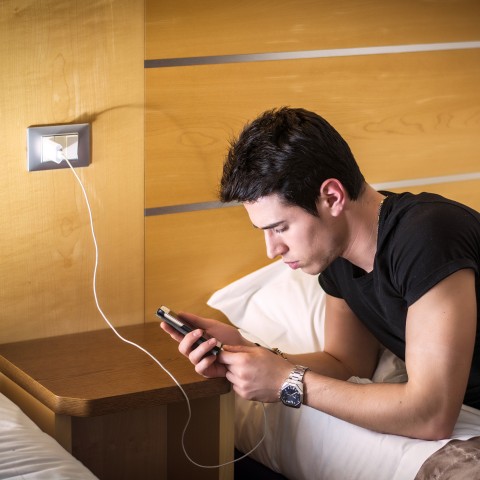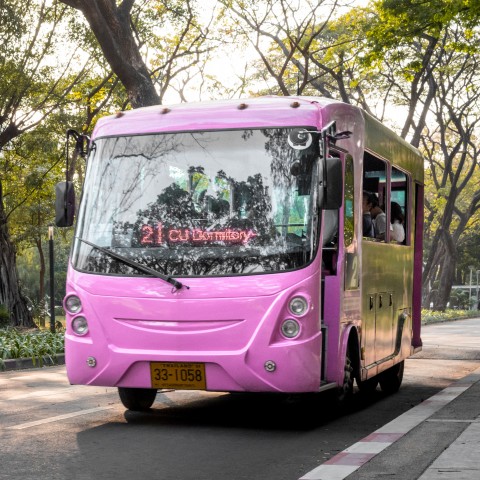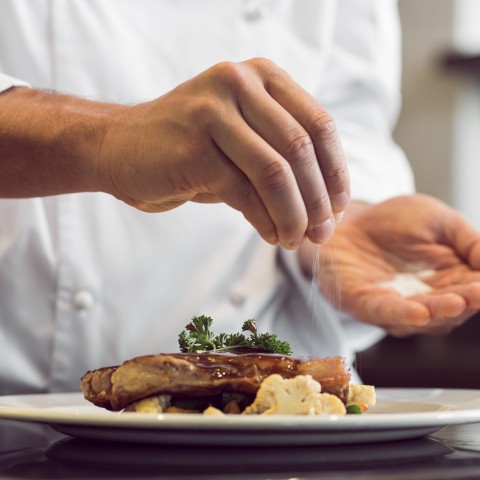
Talking about nouns, everyone is familiar with them, because we talk about them every single day. It’s just such an active participant in our daily conversations that we can’t ignore them, especially as a diligent language learner. As a Chinese beginner, you’ve probably struggled with nouns in Chinese sentences and how to use them in Chinese grammar.
The word “noun” in Chinese language is 名词 (míng cí). Nouns in Chinese grammar structures aren’t difficult to master, and they follow exactly the same rules as nouns do in English. As subjects, they’re placed before verbs; as objects, they’re placed after verbs.
We’ve prepared a variety of Chinese nouns lists for you to enjoy, and each of these basic Chinese nouns is accompanied by example sentences. You’ll also be able to see these examples and nouns in Chinese pinyin for your learning convenience. Let’s start!

Table of Contents
- Appliances
- Technology
- Transportation
- Restaurant
- School Essentials
- Occupation
- Family Members
- Body Parts
- Time
- Animals
- Conclusion
1. Appliances

In today’s world, some of the top Chinese nouns you should know are those related to appliances. Keep these words handy, and try using them in your next conversation to practice!
1. Television – 电视 (diàn shì)
In Chinese: 看电视是一件很放松的事。Pinyin: Kàn diàn shì shì yí jiàn hěn fàng sōng de shì.
In English: Watching television is a very relaxing thing to do.
2. Refrigerator – 冰箱 (bīng xiāng)
In Chinese: 记得把吃不完的食物即时放回冰箱里。Pinyin: Jì de bǎ chī bu wán de shí wù jí shí fàng huí bīng xiāng li.
In English: Remember to put the leftovers in the refrigerator.
3. Air Conditioner – 空调 (kōng tiáo)
In Chinese: 夏天真是个需要空调的季节。Pinyin: Xià tiān zhēn shì gè xū yào kōng tiáo de jì jié.
In English: Summer is an air-conditioner-essential season.
4. Washer – 洗衣机 (xǐ yī jī)
In Chinese: 在原来没有洗衣机的年代, 大家都习惯用手洗衣服。Pinyin: Zài yuán lái méi yǒu xǐ yī jī de nián dài, dà jiā dōu xí guàn yòng shǒu xǐ yī fu.
In English: Back when there was no washer, people were used to washing clothes by hand.
5. Microwave – 微波炉 (wēi bō lú)
In Chinese: 微波炉真是个方便的发明,能快速把食物加热。Pinyin: Wēi bō lú zhēn shì gè fāng biàn de fā míng, néng kuài sù bǎ shí wù jiā rè.
In English: Microwaves are such a convenient invention; they can heat up food so fast.
6. Fan – 风扇 (fēng shàn)
In Chinese: 比起空调,我还是更喜欢风扇的自然风。Pinyin: Bǐ qǐ kōng tiáo, wǒ hái shì gèng xǐ huan fēng shàn de zì rán fēng.
In English: Instead of the air conditioner, I prefer the natural wind that a fan produces.
7. Hair Dryer – 吹风机 (chuī fēng jī)
In Chinese: 比起让头发自然干,我更喜欢用吹风机。Pinyin: Bǐ qǐ ràng tóu fa zì rán gān, wǒ gèng xǐ huān yòng chuī fēng jī.
In English: I prefer to use a hair dryer instead of letting my hair dry naturally.
8. Toothbrush – 牙刷 (yá shuā)
In Chinese: 牙刷上容易产生细菌,所以需要经常更换。Pinyin: Yá shuā shang róng yì chǎn shēng xì jūn, suǒ yǐ xū yào jīng cháng gèng huàn.
In English: It’s easy to produce bacteria on a toothbrush, so it’s necessary to get new ones regularly.
2. Technology
As you learn Chinese nouns, this is a category you really can’t skip! Here are the most common Chinese nouns associated with technology.

We are living in a technology-dependent era!
1. Computer – 电脑 (diàn nǎo)
In Chinese: 电脑真是一个伟大的发明,为人们提供了不少便利。Pinyin: Diàn nǎo zhēn shì yí gè wěi dà de fā míng, wèi rén men tí gòng le bù shǎo biàn lì.
In English: Computers are a spectacular invention that provide so much convenience for humans.
2. Laptop – 笔记本电脑 (bǐ jì běn diàn nǎo)
In Chinese: 我有随身携带笔记本电脑的习惯。Pinyin: Wǒ yǒu suí shēn xié dài bǐ jì běn diàn nǎo de xí guàn.
In English: I have a habit of taking my laptop everywhere with me.
3. Tablet – 平板电脑 (píng bǎn diàn nǎo)
In Chinese: 在上课时,我一般用平板电脑记笔记。Pinyin: Zài shàng kè shí, wǒ yī bān yòng píng bǎn diàn nǎo jì bǐ jì.
In English: When I am in a class, I usually use a tablet to take notes.
4. Cellphone – 手机 (shǒu jī)
In Chinese: 现代人的生活都离不开手机。Pinyin: Xiàn dài rén de shēng huó dōu lí bu kāi shǒu jī.
In English: In modern society, it’s hard to live without our phones.
5. Headphones – 耳机 (ěr jī)
In Chinese: 戴上耳机听音乐的时候,我彷佛在另一个世界。Pinyin: Dài shang ěr jī tīng yīn yuè de shí hou, wǒ fǎng fú zài lìng yí gè shì jiè.
In English: When I wear my headphones to listen to music, I feel like I’m in a whole different world.
6. Charger – 充电器 (chōng diàn qì)
In Chinese: 我每天出门都会带上手机充电器,以防万一。Pinyin: Wǒ měi tiān chū mén dōu huì dài shang shǒu jī chōng diàn qì, yǐ fáng wàn yī.
In English: Every time I leave the house, I take my phone charger with me just in case.
7. Wifi – Wifi (Wifi)
In Chinese: 我喜欢在有Wifi的咖啡馆写作业。Pinyin: Wǒ xǐ huān zài yǒu Wifi de kā fēi guǎn xiě zuò yè.
In English: I like to go to coffee shops that provide wifi and do my homework there.
8. Application – 软件 (ruǎn jiàn)
In Chinese: 我喜欢在手机上下载很多不同的软件。Pinyin: Wǒ xǐ huān zài shǒu jī shang xià zǎi hěn duō bù tóng de ruǎn jiàn.
In English: I like to download many different types of applications on my phone.
9. Website – 网站 (wǎng zhàn)
In Chinese: 我最近在学习网站设计。Pinyin: Wǒ zuì jìn zài xué xí wǎng zhàn shè jì.
In English: Recently, I have been learning about website design.
10. Photo – 照片 (zhào piàn)
In Chinese: 我很喜欢看老照片怀念过去。Pinyin: Wǒ hěn xǐ huān kàn lǎo zhào piàn huái niàn guò qù.
In English: I enjoy looking at old pictures to reminisce.
11. Account – 账号 (zhàng hào)
In Chinese: 很多网站要求用户注册账号之后才能进行购物。Pinyin: Hěn duō wǎng zhàn yāo qiú yòng hù zhù cè zhàng hào zhī hòu cái néng jìn xíng gòu wù.
In English: Many websites require users to have an account in order to make a purchase there.
12. Password – 密码 (mì mǎ)
In Chinese: 我经常忘记自己设置的密码。Pinyin: Wǒ jīng cháng wàng jì zì jǐ shè zhì de mì mǎ.
In English: I often forget about the password I set up for myself.
3. Transportation

What is your favorite type of transportation?
1. Airplane – 飞机 (fēi jī)
In Chinese: 我仍然记得自己小时候第一次坐飞机有多么兴奋。Pinyin: Wǒ réng rán jì de zì jǐ xiǎo shí hou dì yī cì zuò fēi jī yǒu duō me xīng fèn.
In English: I still remember how excited I was, at a young age, when I was on an airplane for the first time.
2. Train – 火车 (huǒ chē)
In Chinese: 我喜欢坐火车去旅游。Pinyin: Wǒ xǐ huan zuò huǒ chē qù lǚ yóu.
In English: I like to take a train for traveling.
3. Subway – 地铁 (dì tiě)
In Chinese: 我觉得地铁是最方便的交通工具之一。Pinyin: Wǒ jué de dì tiě shì zuì fāng biàn de jiāo tōng gōng jù zhī yī.
In English: I think the subway is one of the most convenient transportation methods.
4. Bus – 公交车 (gōng jiāo chē)
In Chinese: 我之所以会迟到,是因为没有赶上公交车。Pinyin: Wǒ zhī suǒ yǐ huì chí dào, shì yīn wèi méi yǒu gǎn shang gōng jiāo chē.
In English: The reason why I was late is because I missed the bus.
5. Taxi – 出租车 (chū zū chē)
In Chinese: 我很喜欢跟出租车司机聊天。Pinyin: Wǒ hěn xǐ huan gēn chū zū chē sī jī liáo tiān.
In English: I like talking to taxi drivers.
6. Bike – 自行车 (zì xíng chē)
In Chinese: 我非常喜欢骑自行车,因为骑车的时候可以看到街头的景色。Pinyin: Wǒ fēi cháng xǐ huan qí zì xíng chē, yīn wèi qí chē de shí hou kě yǐ kàn dào jiē tóu de jǐng sè.
In English: I enjoy riding a bike because I get to see beautiful scenery on the streets.
7. Airport – 机场 (jī chǎng)
In Chinese: 每天在机场都有很多人依依不舍地分别。Pinyin: Měi tiān zài jī chǎng dōu yǒu hěn duō rén yī yī bù shě de fēn bié.
In English: At the airport, each day there are so many people who are saying goodbyes though they don’t want to.
8. Train Station – 火车站 (huǒ chē zhàn)
In Chinese: 有很多人在火车站过夜。Pinyin: Yǒu hěn duō rén zài huǒ chē zhàn guò yè.
In English: Many people are spending the night at the train station.
9. Bus Stop – 公交车站 (gōng jiāo chē zhàn)
In Chinese: 过了马路你就会看到公交车站。Pinyin: Guò le mǎ lù nǐ jiù huì kàn dao gōng jiāo chē zhàn.
In English: You will see the bus stop once you go across the road.
10. Traffic Light – 红绿灯 (hóng lǜ dēng)
In Chinese: 开车等红绿灯时千万不能看手机。Pinyin: Kāi chē děng hóng lǜ dēng shí qiān wàn bù néng kàn shǒu jī.
In English: Don’t ever look at your phone while waiting for a traffic light in the car.
11. Intersection – 十字路口 (shí zì lù kǒu)
In Chinese: 等你过了十字路口,往右转就可以看见我们了。Pinyin: Děng nǐ guò le shí zì lù kǒu, wǎng yòu zhuǎn jiù kě yǐ kàn jiàn wǒ men le.
In English: After you pass the intersection, just turn right and you will see us immediately.
4. Restaurant

Who doesn’t enjoy eating at a restaurant which serves delicious food?
Now, here are common Chinese nouns food-lovers should be sure to memorize! These words are essential for restaurants in particular.
1. Table – 桌子(zhuō zi)
In Chinese: 我们在五号桌等你。Pinyin: Wǒ men zài wǔ hào zhuō děng nǐ.
In English: We will be waiting for you at table 5.
2. Menu – 菜单 (cài dān)
In Chinese: 请问可以再给我们一份菜单吗?Pinyin: Qǐng wèn kě yǐ zài gěi wǒ men yí fèn cài dān ma?
In English: Can you give us one more menu, please?
3. Waiter – 服务员 (fú wù yuán)
In Chinese: 这个餐厅的服务员很友好。Pinyin: Zhè gè cān tīng de fú wù yuán hěn yǒu hǎo.
In English: The waiters at this restaurant are very friendly.
4. Bill – 账单 (zhàng dān)
In Chinese: 麻烦您给我们一下账单。Pinyin: Má fan nín gěi wǒ men yí xià zhàng dān.
In English: Please give us the bill.
5. Spoon – 勺子 (sháo zi)
In Chinese: 比起筷子,我喜欢用勺子吃米饭。Pinyin: Bǐ qǐ kuài zi, wǒ xǐ huan yòng sháo zi chī mǐ fàn.
In English: I like to eat rice with a spoon instead of chopsticks.
6. Chopsticks – 筷子 (kuài zi)
In Chinese: 很多西方国家的人不会用筷子。Pinyin: Hěn duō xī fāng guó jiā de rén bú huì yòng kuài zi.
In English: Many western people don’t know how to use chopsticks.
7. Plate – 盘子 (pán zi)
In Chinese: 在家里,妈妈负责做饭,我负责洗盘子。Pinyin: Zài jiā li, mā ma fù zé zuò fàn, wǒ fù zé xǐ pán zi.
In English: Mom is in charge of cooking, and I am in charge of washing dishes in the house.
8. Bowl – 碗 (wǎn)
In Chinese: 请给我来一碗面。Pinyin: Qǐng gěi wǒ lái yì wǎn miàn.
In English: Please give me a bowl of noodles.
9. Water – 水 (shuǐ)
In Chinese: 夏天非常干燥,我们更应该多喝水。Pinyin: Xià tiān fēi cháng gàn zào, wǒ men gèng yīng gāi duō hē shuǐ.
In English: Summer is a dry season; we should drink even more water.
10. Tea – 茶 (chá)
In Chinese: 茶是中国很重要的一个文化之一。Pinyin: Chá shì zhōng guó hěn zhòng yào de yí gè wén huà zhī yī.
In English: Tea is one of the most important cultural aspects in China.
11. Vegetables – 蔬菜 (shū cài)
In Chinese: 多吃蔬菜对身体有好处。Pinyin: Duō chī shū cài duì shēn tǐ yǒu hǎo chù.
In English: Eating vegetables is good for your health.
12. Seafood – 海鲜 (hǎi xiān)
In Chinese: 海鲜自助是我的最爱之一。Pinyin: Hǎi xiān zì zhù shì wǒ de zuì ài zhī yī.
In English: The seafood buffet is one of my favorite places.
5. School Essentials

Don’t you miss being a student?
1. College – 大学 (dà xué)
In Chinese: 我很期待大学的生活。Pinyin: Wǒ hěn qī dài dà xué de shēng huó.
In English: I am looking forward to my college life.
2. High School – 高中 (gāo zhōng)
In Chinese: 在过去的高中三年时间里,我们都成长了许多。Pinyin: Zài guò qù de gāo zhōng sān nián shí jiān li, wǒ men dōu chéng zhǎng le xǔ duō.
In English: In the past three years at high school, we all grew up a lot.
3. Middle School – 初中 (chū zhōng)
In Chinese: 我很想念我初中结识的朋友。Pinyin: Wǒ hěn xiǎng niàn wǒ chū zhōng jié shí de péng you.
In English: I miss my friends from middle school very much.
4. Elementary School – 小学 (xiǎo xué)
In Chinese: 小学是我最无忧无虑的日子。Pinyin: Xiǎo xué shì wǒ zuì wú yōu wú lǜ de rì zi.
In English: The days at elementary school were the happiest time ever.
5. Class – 班级 (bān jí)
In Chinese: 我觉得我们班级是最优秀的。Pinyin: Wǒ jué de wǒ men bān jí shì zuì yōu xiù de.
In English: I think my class is the best one of all.
6. Book – 书 (shū)
In Chinese: 请把你的书打开到第90页。Pinyin: Qǐng bǎ nǐ de shū dǎ kāi dào dì jiǔ shí yè.
In English: Please open your book to the 90th page.
7. Teacher – 老师 (lǎo shī)
In Chinese: 我的老师是一位值得敬佩的人。Pinyin: Wǒ de lǎo shī shì yí wèi zhí dé jìng pèi de rén.
In English: My teacher is someone that deserves respect and admiration.
8. Student – 学生 (xué shēng)
In Chinese: 学生时期的我很听父母的话。Pinyin: Xué shēng shí qī de wǒ hěn tīng fù mǔ de huà.
In English: When I was a student, I used to be very obedient to my parents.
9. Classmate – 同班同学 (tóng bān tóng xué)
In Chinese: 我的同班同学们都十分友好。Pinyin: Wǒ de tóng bān tóng xué men dōu shí fēn yǒu hǎo.
In English: All my classmates are very friendly.
10. Major – 专业 (zhuān yè)
In Chinese: 我很开心选择的专业是自己所热爱的。Pinyin: Wǒ hěn kāi xīn xuǎn zé de zhuān yè shì zì jǐ suǒ rè ài de.
In English: I am very happy that the major I chose for myself is something I am passionate about.
11. Exam – 考试 (kǎo shì)
In Chinese: 我觉得自己在这次的考试中发挥得很好。Pinyin: Wǒ jué de zì jǐ zài zhè cì de kǎo shì zhōng fā huī de hěn hǎo.
In English: I think I did very well on this exam.
12. Homework – 作业 (zuò yè)
In Chinese: 很多学生都会拖到快交作业了才开始写。Pinyin: Hěn duō xué shēng dōu huì tuō dào kuài jiāo zuò yè le cái kāi shǐ xiě.
In English: Many students procrastinate until the homework is due.
6. Occupation

1. Doctor – 医生 (yī shēng)
In Chinese: 医生是一个神圣的职业。Pinyin: Yī shēng shì yí gè shén shèng de zhí yè.
In English: Being a doctor is a divine occupation.
2. Lawyer – 律师 (lǜ shī)
In Chinese: 作为一名律师,你需要拥有出色的口才。Pinyin: Zuò wéi yì míng lǜ shī, nǐ xū yào yōng yǒu chū sè de kǒu cái.
In English: As a lawyer, you need to have excellent eloquence.
3. Nurse – 护士 (hù shi)
In Chinese: 昨天给我打针的护士很友善。Pinyin: Zuó tiān gěi wǒ dǎ zhēn de hù shi hěn yǒu shàn.
In English: The nurse who gave me a shot yesterday was very nice.
4. Chef – 厨师 (chú shī)
In Chinese: 一名好厨师会把自己对下厨的全部热情注入到食物中。Pinyin: Yì míng hǎo chú shī huì bǎ zì jǐ duì xià chú de quán bù rè qíng zhù rù dào shí wù zhōng.
In English: An excellent chef will devote all his passion into the food he cooks.
5. Police – 警察 (jǐng chá)
In Chinese: 想成为一名警察,一定要敢于奉献。Pinyin: Xiǎng chéng wéi yì míng jǐng chá, yí dìng yào gǎn yú fèng xiàn.
In English: You have to be brave enough to dedicate your life in order to become a police officer.
7. Family Members

1. Family – 家庭 (jiā tíng)
In Chinese: 家庭是无法被取代的。Pinyin: Jiā tíng shì wú fǎ bèi qǔ dài de.
In English: Nothing can replace a family.
2. Mom / Dad – 妈妈 / 爸爸 (mā ma / bà ba)
In Chinese: 妈妈 / 爸爸很宠爱弟弟。Pinyin: Mā ma / Bà ba hěn chǒng ài dì di.
In English: Mom / Dad spoils my younger brother a lot.
3. Parents – 父母 (fù mǔ)
In Chinese: 我和父母就像朋友一般亲近。Pinyin: Wǒ hé fù mǔ jiù xiàng péng you yì bān qīn jìn.
In English: My parents and I are as close as friends.
4. Husband / Wife – 丈夫 / 妻子 (zhàng fu / qī zǐ)
In Chinese: 她/他与自己的丈夫/妻子十分恩爱。Pinyin: Tā / Tā yǔ zì jǐ de zhàng fu / qī zǐ shí fēn ēn ài.
In English: She / He is very loving with her / his husband / wife.
5. Daughter / Son – 女儿 / 儿子 (nǚ ér / ér zi)
In Chinese: 即使离得很远,他的女儿 / 儿子还是会经常去看他。Pinyin: Jí shǐ lí de hěn yuǎn, tā de nǚ ér / ér zi hái shì huì jīng cháng qù kàn tā.
In English: His daughter / son visits him a lot even though they are far away from each other.
6. Grandmother / Grandfather (from Dad’s side) – 奶奶 / 爷爷 (yé ye / nǎi nai)
In Chinese: 我最后悔的事情就是奶奶 / 爷爷去世的时候我没来得及去送行。Pinyin: Wǒ zuì hòu huǐ de shì qing jiù shì nǎi nai / yé ye qù shì de shí hou wǒ méi lái de jí qù sòng xíng.
In English: The thing that I regret the most was not being able to be with my grandmother / grandfather when she / he was gone.
7. Grandmother / Grandfather (from Mom’s side) – 姥姥 / 姥爷 (lǎo lao / lǎo ye)
In Chinese: 姥姥 / 姥爷经常给我做好吃的。Pinyin: Lǎo lao / Lǎo ye jīng cháng gěi wǒ zuò hǎo chī de.
In English: My grandmother / grandfather always cooks delicious food for me.
8. Body Parts

1. Body – 身体 (shēn tǐ)
In Chinese: 因为昨天爬了一整天的山,导致我现在身体酸疼。
Pinyin: Yīn wèi zuó tiān pá le yì zhěng tiān de shān, dǎo zhì wǒ xiàn zài shēn tǐ suān téng.
In English: Since I was hiking all day yesterday, my body is now feeling sore all over the place.
2. Head – 头 (tóu)
In Chinese: 我刚才一不小心磕到了头。
Pinyin: Wǒ gāng cái yí bù xiǎo xīn kē dào le tóu.
In English: I hit my head by accident just now.
3. Arm – 胳膊 (gē bo)
In Chinese: 爸爸的胳膊力气很大,我记得小时候经常被他举起来。
Pinyin: Bà ba de gē bo lì qi hěn dà, wǒ jì de xiǎo shí hòu jīng cháng bèi tā jǔ qǐ lái.
In English: My dad’s arms are very strong; I remember I used to be lifted up by him when I was little.
4. Leg – 腿 (tuǐ)
In Chinese: 那位舞蹈演员的腿可真柔韧。
Pinyin: Nà wèi wǔ dǎo yǎn yuán de tuǐ kě zhēn róu rèn.
In English: That dancer’s legs are really flexible.
5. Eye – 眼睛 (yǎn jīng)
In Chinese: 虽然她的眼睛是盲的,但是她心灵的眼睛一直是明亮的。
Pinyin: Suī rán tā de yǎn jīng shì máng de, dàn shì tā xīn líng de yǎn jīng yì zhí shì míng liàng de.
In English: Her eyes are blind, but the eyes of her heart will always stay bright.
6. Nose – 鼻子 (bí zi)
In Chinese: 狗的鼻子嗅觉十分灵敏。
Pinyin: Gǒu de bí zi xiù jué shí fēn líng mǐn.
In English: A dog’s nose possesses strong olfaction.
7. Mouth – 嘴 (zuǐ)
In Chinese: 弟弟经常在吃饭的时候用嘴吸溜面条。
Pinyin: Dì di jīng cháng zài chī fàn de shí hou yòng zuǐ xī liu miàn tiáo.
In English: My younger brother always slurps noodles with his mouth while eating.
8. Face – 脸 (liǎn)
In Chinese: 你的脸上有东西。
Pinyin: Nǐ de liǎn shang yǒu dōng xi.
In English: There is something on your face.
9. Hand – 手 (shǒu)
In Chinese: 初次见面时握手是一种礼貌的行为。
Pinyin: Chū cì jiàn miàn shí wò shǒu shì yì zhǒng lǐ mào de xíng wéi.
In English: Shaking hands the first time you meet someone is a polite gesture.
10. Foot – 脚 (jiǎo)
In Chinese: 昨天在跑步时,我一不小心扭伤了脚。
Pinyin: Zuó tiān zài pǎo bù shí, wǒ yí bù xiǎo xīn niǔ shāng le jiǎo.
In English: When I was running yesterday, I injured my foot by accident.
9. Time
Here are the most important Chinese time nouns for you to study! Knowing these words will greatly benefit you in day-to-day life.
1. Today – 今天 (jīn tiān)
2. Tomorrow – 明天 (míng tiān)
3. The Day Before Yesterday – 前天 (qián tiān)
4. The Day After Tomorrow – 后天 (hòu tiān)
In Chinese: 今天 / 明天 / 前天 / 后天是我最好的朋友的生日。
Pinyin: Jīn tiān / míng tiān / qián tiān / hòu tiān shì wǒ zuì hǎo de péng you de shēng rì.
In English: Today / Tomorrow / The day before yesterday / The day after tomorrow is my best friend’s birthday.
5. Week – 周 (zhōu)
Monday – 周 (zhōu yī)
Tuesday – 周二 (zhōu èr)
Wednesday – 周三 (zhōu sān)
Thursday – 周四 (zhōu sì)
Friday – 周五 (zhōu wǔ)
Saturday – 周六 (zhōu liù)
Sunday – 周日 (zhōu rì)
In Chinese: 周六是我一周中最喜欢的日子。
Pinyin: Zhōu liù shì wǒ yì zhōu zhōng zuì xǐ huān de rì zi.
In English: Saturday is my favorite day of the week.
6. Day – 天 (tiān)
In Chinese: 再过十天就是我的生日了,这让我感到非常激动。
Pinyin: Zài guò shí tiān jiù shì wǒ de shēng rì le, zhè ràng wǒ gǎn dào fēi cháng jī dòng.
In English: My birthday is in ten days and this makes me very excited.
7. Month – 月 (yuè)
In Chinese: 每年的二月份是中国的春节。
Pinyin: Měi nián de èr yuè fèn shì zhōng guó de chūn jié.
In English: Every year in February is the Chinese New Year.
8. Year – 年 (nián)
In Chinese: 不管多少年过去,我们的友谊还是没有变。
Pinyin: Bù guǎn duō shǎo nián guò qu, wǒ men de yǒu yì hái shì méi yǒu biàn.
In English: No matter how many years have passed by, there is not a single thing that’s changed in our friendship.
9. Time – 时间 (shí jiān)
In Chinese: 时间就是金钱。
Pinyin: Shí jiān jiù shì jīn qián.
In English: Time is money.
10. Hour – 小时 (xiǎo shí)
In Chinese: 他每次至少迟到一个小时。
Pinyin: Tā měi cì zhì shǎo chí dào yí gè xiǎo shí.
In English: He is always at least an hour late every time.
11. Minute – 分钟 (fēn zhōng)
In Chinese: 我还有五分钟就到。
Pinyin: Wǒ hái yǒu wǔ fēn zhōng jiù dào.
In English: I will be there in five minutes.
10. Animals


1. Body – 身体 (shēn tǐ)
In Chinese: 因为昨天爬了一整天的山,导致我现在身体酸疼。Pinyin: Yīn wèi zuó tiān pá le yì zhěng tiān de shān, dǎo zhì wǒ xiàn zài shēn tǐ suān téng.
In English: Since I was hiking all day yesterday, my body is now feeling sore all over the place.
2. Head – 头 (tóu)
In Chinese: 我刚才一不小心磕到了头。Pinyin: Wǒ gāng cái yí bù xiǎo xīn kē dào le tóu.
In English: I hit my head by accident just now.
3. Arm – 胳膊 (gē bo)
In Chinese: 爸爸的胳膊力气很大,我记得小时候经常被他举起来。Pinyin: Bà ba de gē bo lì qi hěn dà, wǒ jì de xiǎo shí hòu jīng cháng bèi tā jǔ qǐ lái.
In English: My dad’s arms are very strong; I remember I used to be lifted up by him when I was little.
4. Leg – 腿 (tuǐ)
In Chinese: 那位舞蹈演员的腿可真柔韧。Pinyin: Nà wèi wǔ dǎo yǎn yuán de tuǐ kě zhēn róu rèn.
In English: That dancer’s legs are really flexible.
5. Eye – 眼睛 (yǎn jīng)
In Chinese: 虽然她的眼睛是盲的,但是她心灵的眼睛一直是明亮的。Pinyin: Suī rán tā de yǎn jīng shì máng de, dàn shì tā xīn líng de yǎn jīng yì zhí shì míng liàng de.
In English: Her eyes are blind, but the eyes of her heart will always stay bright.
6. Nose – 鼻子 (bí zi)
In Chinese: 狗的鼻子嗅觉十分灵敏。Pinyin: Gǒu de bí zi xiù jué shí fēn líng mǐn.
In English: A dog’s nose possesses strong olfaction.
7. Mouth – 嘴 (zuǐ)
In Chinese: 弟弟经常在吃饭的时候用嘴吸溜面条。Pinyin: Dì di jīng cháng zài chī fàn de shí hou yòng zuǐ xī liu miàn tiáo.
In English: My younger brother always slurps noodles with his mouth while eating.
8. Face – 脸 (liǎn)
In Chinese: 你的脸上有东西。Pinyin: Nǐ de liǎn shang yǒu dōng xi.
In English: There is something on your face.
9. Hand – 手 (shǒu)
In Chinese: 初次见面时握手是一种礼貌的行为。Pinyin: Chū cì jiàn miàn shí wò shǒu shì yì zhǒng lǐ mào de xíng wéi.
In English: Shaking hands the first time you meet someone is a polite gesture.
10. Foot – 脚 (jiǎo)
In Chinese: 昨天在跑步时,我一不小心扭伤了脚。Pinyin: Zuó tiān zài pǎo bù shí, wǒ yí bù xiǎo xīn niǔ shāng le jiǎo.
In English: When I was running yesterday, I injured my foot by accident.
9. Time
Here are the most important Chinese time nouns for you to study! Knowing these words will greatly benefit you in day-to-day life.
1. Today – 今天 (jīn tiān)
2. Tomorrow – 明天 (míng tiān)
3. The Day Before Yesterday – 前天 (qián tiān)
4. The Day After Tomorrow – 后天 (hòu tiān)
In Chinese: 今天 / 明天 / 前天 / 后天是我最好的朋友的生日。Pinyin: Jīn tiān / míng tiān / qián tiān / hòu tiān shì wǒ zuì hǎo de péng you de shēng rì.
In English: Today / Tomorrow / The day before yesterday / The day after tomorrow is my best friend’s birthday.
5. Week – 周 (zhōu)
Monday – 周 (zhōu yī)
Tuesday – 周二 (zhōu èr)
Wednesday – 周三 (zhōu sān)
Thursday – 周四 (zhōu sì)
Friday – 周五 (zhōu wǔ)
Saturday – 周六 (zhōu liù)
Sunday – 周日 (zhōu rì)
In Chinese: 周六是我一周中最喜欢的日子。
Pinyin: Zhōu liù shì wǒ yì zhōu zhōng zuì xǐ huān de rì zi.
In English: Saturday is my favorite day of the week.
6. Day – 天 (tiān)
In Chinese: 再过十天就是我的生日了,这让我感到非常激动。Pinyin: Zài guò shí tiān jiù shì wǒ de shēng rì le, zhè ràng wǒ gǎn dào fēi cháng jī dòng.
In English: My birthday is in ten days and this makes me very excited.
7. Month – 月 (yuè)
In Chinese: 每年的二月份是中国的春节。Pinyin: Měi nián de èr yuè fèn shì zhōng guó de chūn jié.
In English: Every year in February is the Chinese New Year.
8. Year – 年 (nián)
In Chinese: 不管多少年过去,我们的友谊还是没有变。Pinyin: Bù guǎn duō shǎo nián guò qu, wǒ men de yǒu yì hái shì méi yǒu biàn.
In English: No matter how many years have passed by, there is not a single thing that’s changed in our friendship.
9. Time – 时间 (shí jiān)
In Chinese: 时间就是金钱。Pinyin: Shí jiān jiù shì jīn qián.
In English: Time is money.
10. Hour – 小时 (xiǎo shí)
In Chinese: 他每次至少迟到一个小时。Pinyin: Tā měi cì zhì shǎo chí dào yí gè xiǎo shí.
In English: He is always at least an hour late every time.
11. Minute – 分钟 (fēn zhōng)
In Chinese: 我还有五分钟就到。Pinyin: Wǒ hái yǒu wǔ fēn zhōng jiù dào.
In English: I will be there in five minutes.
10. Animals

Are you an animal lover?
1. Cat – 猫 (māo)
In Chinese: 猫是一种十分敏捷的动物。Pinyin: Māo shì yì zhǒng shí fēn mǐn jié de dòng wù.
In English: Cats are very agile animals.
2. Dog – 狗 (gǒu)
In Chinese: 狗是人类最忠实的朋友。Pinyin: Gǒu shì rén lèi zuì zhōng shí de péng you.
In English: Dogs are the most loyal friend for humans.
3. Bird – 鸟 (niǎo)
In Chinese: 我喜欢清晨的鸟叫声。Pinyin: Wǒ xǐ huan qīng chén de niǎo jiào shēng.
In English: I enjoy birds’ singing in the morning.
4. Squirrel – 松鼠 (sōng shǔ)
In Chinese: 小松鼠吃东西的样子很可爱。Pinyin: Xiǎo sōng shǔ chī dōng xi de yàng zi hěn kě ài.
In English: The way squirrels eat food is so adorable.
5. Snake – 蛇 (shé)
In Chinese: 蛇是一种冷血动物。Pinyin: Shé shì yì zhǒng lěng xuè dòng wù.
In English: Snakes are cold-blooded animals.
6. Horse – 马 (mǎ)
In Chinese: 马是人类最原始的交通工具之一。Pinyin: Mǎ shì rén lèi zuì yuán shǐ de jiāo tōng gōng jù zhī yī.
In English: Horses are one of the most primary transportation methods for humans.
7. Deer – 鹿 (lù)
In Chinese: 我从没有在森林中见到过鹿。Pinyin: Wǒ cóng méi yǒu zài sēn lín zhōng jiàn dao guo lù.
In English: I’ve never seen a deer in the woods.
8. Fish – 鱼 (yú)
In Chinese: 鱼儿们自由自在地在水中嬉戏着。Pinyin: Yú er men zì yóu zì zài de zài shuǐ zhōng xī xì zhe.
In English: Fish are swimming freely and playfully in the water.
9. Pig – 猪 (zhū)
In Chinese: 猪看起来很笨,实际上很聪明。Pinyin: Zhū kàn qǐ lái hěn bèn, shí jì shang hěn cōng míng.
In English: Although pigs seem to be dumb, they are actually very smart.
10. Cow – 牛 (niú)
In Chinese: 牛的力气很大。Pinyin: Niú de lì qì hěn dà.
In English: Cows have great strength.
11. Conclusion
Remember that “noun” in Chinese is 名词 (míng cí), and we’re sure that after this long journey of studying these Chinese nouns lists, your brain must have absorbed some of the common Chinese nouns. Even if you haven’t memorized all 100+ Chinese nouns, know that you’ve taken a great step toward getting there, and practice is your best friend!
Of course, there’s a lot more to talk about when it comes to nouns in the Chinese language; these treasures are all waiting for you at ChineseClass101.com. Whether you’re looking for nouns in Chinese grammar structures or nouns in the Chinese language in general, we have everything ready for you there! Click on the link to collect your treasure right now!
And before you go, let us know in the comments what new nouns in Chinese you learned! Are there any Chinese nouns you still want to know? We look forward to hearing from you!










